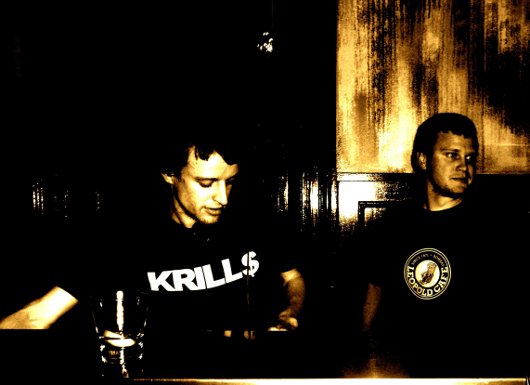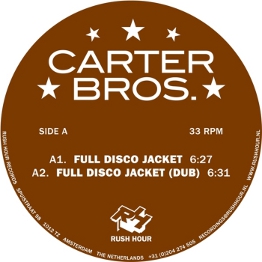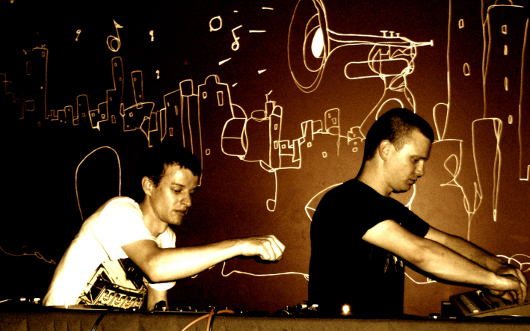Carter Bros: Full Disco Jacket

The first point to make about the production moniker of Australian duo Carter Bros is that they actually are siblings. A small point, perhaps, but it’s a reminder that with Tim and Gavin, what you see is what you get; these two are as far removed from the archetypal superstar DJ as it’s possible to be. Down to earth, with little interest in hustling or self promotion, the duo’s star has risen purely off the back of their consistently high quality house and techno productions.
The pair originally hail from Mildura, a small country town in regional Victoria with a population of 30,000. They now reside in Adelaide, the South Australian capital with a small but proud heritage of discerning electronic music. After working in relative anonymity for a number of years (their first two albums were self released and the third came out on Adelaide label Cuckoo Music), in 2011 they saw their work being appreciated across the globe. The first international label to spot the Carter Bros was Dutch imprint Rush Hour, who released the Full Disco Jacket 12″ last year. They were followed by Detroit’s Monty Luke – long time right hand of Carl Craig at Planet E – who chose the Carter Bros for the second release on his fledgling Black Catalogue imprint. We sent our Australian scribe, James Manning, down to Adelaide to speak to Tim and Gavin about the links between skateboarding and techno, cats, and the perils of Soundcloud promotion.
You two are originally from Mildura. What sort of outlets did you have for discovering new music?
Gavin: We did have one pretty cool CD store called Melbergs, we always ordered CDs in and out of there.
Tim: There was good radio show that was on once a week, late at night. They would play everything from techno to the latest German trance. They played everything but there was a lot of techno. It was a bit out there so I guess that’s why we were attracted to it. Getting into music probably started through skateboarding – I was a full on skateboarder, I lived for it. Every Friday night I’d be drunk skating in town and afterwards we’d head back to my friend Shane’s house and set up a band room and go for it, jamming on guitars and kids’ drums. As a skateboarder in the early 90s it was all about supporting the independents, you weren’t allowed to wear a pair of Nikes or anything that was a brand. We would support skateboarders that started their own labels and support the bands they were in. I guess that same ethos of the underground with its DIY attitude has affected our music. That was how we spent our Friday nights, skateboarding and jamming out as punks.
Was punk was the Mildura soundtrack?
Tim: As a skateboarder you loved punk, hip-hop, metal, speed metal and in the early 90s there was rave I guess, which was a bit out there so naturally we were attracted to it. Maybe growing up in the desert made us appreciate the stripped back feel of techno (laughs). It could be, you never know.
What brought about the move to Adelaide? Melbourne or Sydney is usually the done thing?
Tim: We used to party in Melbourne a lot but we would go to Adelaide more because it was closer to Mildura. We’d go to the record stores and buy up big.
Gavin: We found the record stores in Adelaide to be really friendly, they’d always help us out.
Tim: We also moved here because there were a few producers we wanted to be a part of.


DJ Bold and HMC?
Tim: Those two for sure.
How involved did you get with those two?
Tim: We didn’t get involved with Cam (HMC) straight away but we did hook up with DJ Bold pretty quickly. Through him we met Amoeba and a group called Cycloid. The labels and producers that attracted us most were DJ Bold and with his VAST Recordings, Undefined Recordings as well as Juice and Dirty House. Not long after I moved to Adelaide DJ Bold had just got back from Germany, he played a crazy live set and I was blown away. I remember thinking that I’d made the right choice in moving to Adelaide. The live work and sets going on at the time were incredible, I wanted to be a part of that, or at least learn from it.
Were you making music at this stage?
Tim: Yeah, we had some simple drum machines, a couple of synths and a mixing desk which was an old crusty fucker. We didn’t know what we were doing but we knew what we liked and tried making it by doing our own thing, and we were really doing our own thing too. We’d sync everything into a big desk and sit there jamming for hours.
Adelaide was considered pretty cutting edge for techno in the 90s.
Tim: It was big. Techno and house was popular. DJs knew how to balance the night. They would warm up properly and progress into techno from there.
There are stories of now Detroit techno legends visiting Adelaide and staying for weeks.
Tim: Maybe they thought people in Adelaide were doing it the right way and we made them feel at home. There is a strange 90s connection between Adelaide and Detroit. Detroit’s influence on Adelaide’s underground is massive. Maybe we shared the same values as Detroit in the way we produced music, ran our labels and went about doing things. Maybe it’s a nice place to be.
The Carter Brothers being an good example of that.
Tim: That’s what we love, that’s it right there. I don’t know what it is about Detroit and the sound of Detroit; I think it is the live feel and all the futurism that comes with it. Isn’t is funny that everything has to be futuristic but at the same time we are using dated analogue technology and recording to tape, yet we are being futuristic whilst we are doing it. That’s strange.
You two also released your first two albums independently.
Tim: We just made some CDs. We are printers by trade so we printed our own covers and manufactured them completely ourselves. We did a launch party with a bit of local distro but didn’t bother hitting up the big distribution companies. We just put it out and said if you want a copy give us a call and we’ll post you one, and we did (laughs). We liked that, who cares about two nutters from Adelaide doing their own thing. I know slow mo house and that kind of thing is quite popular right now, but we weren’t trying to be popular, we were just trying to do what we wanted to do and both albums came about from doing that. You can try and push your music by blogging, Soundclouding or sending CDs and emails to people, but really who’s got the time? The people you send your music to don’t know you, so there is no connection. Those tracks on the first two albums were tracks influenced by us DJing in Adelaide’s clubs. The samples came from the records that we played, so we created a couple of albums for our friends, family, clubs and local punters.
Sampling plays a big role in your production?
Tim: The samples we use are just from playing records that we like, it could be reggae, it could be dub, it could be disco, it could be anything, you just hear it. We would play 3 or 4 hour sets, 4 or 5 nights a week and we’d hear the samples pop out, we’d start hearing little baby things, micro loops and sounds that we thought might work. From there it is important to make the call if you are going to make a re edit or a house edit, or are you going to take it further and make a techno track? Is the sample going to be a loop inside of a track that you completely work a drum machine and synth over the top? Or will it be an edit? It can be a strange line to walk when deciding whether to make a house edit of an old disco track or taking a loop and making an entirely new house or techno track of your own.
Gavin: I feel like taking a loop and making a track out of it is much more of an old fashioned way of producing, rather than the re-edit which has become quite fashionable these days.
Tim: That’s because of the software influence I think, software has made it very easy to take a loop and put a kick drum over the top.
Gavin: Taking one loop and working with it is where house started for us. We’ve tried to stick to that.
Tim: We might find a loop of some percussion from somewhere and a bass line from somewhere else. We’ll jam them together and add our own keys and synths over the top and write a track from that. We always want to be live jamming, we put all the parts together but it has to be recorded with us filtering, playing keys doing everything live in one take. We can go back and make some micro edits but we prefer to have that live feel, it takes the music somewhere different and turns it into something else.
You guys have a live show. How is it going at the moment?
Tim: We were all hardware a long time ago, then we decided to have a go with laptops and it didn’t work.
Gavin: We couldn’t have total control over the things we wanted. It didn’t feel like an organic process when using a laptop. It was almost too programmed.
Tim: We didn’t feel we had enough freedom with a laptop to take our set anywhere we wanted at anytime we wanted, we like to be able to do that. If we are going to play live we want to be true to the word live.
So laptops are banished from the live show?
Tim: It might come back just as a sampler. Laptops work really well as samplers.
Gavin: We just have to change our work flow. We are finding a way around what we are using so we can make it work the way we want it to work.
Tim: You want to be able to rock up and go bang with a big brick, put that brick on the desk and manipulate it with a few knobs and keys, then bash it and push a big punching sound through the system. You don’t want any anomalies like what the digital world can throw up at you.

Coming from a time when you released and distributed your music yourselves, to getting a release with Rush Hour and Black Catalogue, has that come through the two of you wanting to do something out of your own sphere?
Tim: There are people blogging, Soundclouding and doing all that which is great, as long as you’re working it’s all good, but for us we sent out about half a dozen copies of each album to half a dozen labels that we liked and thought might be interested. None of them were interested at the time, but they were supportive and passed it on.
Gavin: The production wasn’t that good anyway (laughs).
Tim: Well that’s not entirely true because we’ve sold too many of the old tracks now.
Gavin: The songwriting was good but the production wasn’t as good as it is now. I think having a polished and finished product in the form of CD to send out was a better option than perhaps blogging.
Tim: Sending out a kooky CD with handmade artwork containing twelve tracks that were all pretty different probably helped us stand out.
Gavin: It’s more likely to grab your attention than a Soundcloud link.
Tim: We’ve been big supporters of Rush Hour. It’s a label we love and they are great at what they do with all the represses, reissues and the big support they have for their artists and Detroit. We have bought a lot of records from them over the years and they’ve filled up our bags for a long while now. We sent them a CD and they happened to be interested in one of the tracks, they held onto it for a couple of years and then decided to put it out. Monty from Black Catalogue got hold of one of those CDs too and tried to pass it on for us, but that fell through. In the end he hung on to it and got in contact a few years later saying he was ready to rumble and ready to put that shit out cause he was a believer. That‘s some pretty legendary stuff from both crews.
You’ve had two releases with Black Catalogue in reasonably quick succession. Can you see yourselves working with Monty Luke on a regular basis?
Gavin: We’d love to keep working with Monty.
Tim: We’ll work with him forever for sure (laughs). He doesn’t choose our tracks straight up, he doesn’t want hooks or whatever, he wants something a bit Sci Fi, he wants something that sounds like the artist. He’s got a kooky taste so I dig that, a possible second EP could be in the works for this year, he’s keen and we’re keen so we are slinging something together.
So far a lot of your released material has been a couple of years old at least. What are you working on at the moment?
Tim: We are working on a lot of new stuff for sure, which at the moment ranges from deep house to straight up techno. We’re always working, you have to write. We decided a long time ago that you have to wake up and realise who you are as an artist, and when you feel comfortable with that you have to keep working on it. You gotta be writing every day.
You are also involved with local institution Cuckoo Bar and Cuckoo Music.
Tim: It’s a small scene here, but it’s a passionate scene. Adelaide’s DJs and producers are very productive and I can see big things coming from some of the younger guys. Some older producers are doing some big things too. I think those big things will come through the channels the younger producers are creating by DJing and working here together as a part of Cuckoo.
Gavin: Cuckoo is a part of the one or two small creative outlets we have here in Adelaide, and it’s our chosen one. It’s a rad little bar with a great sound system, set up correctly. They do great cocktails and it has a great atmosphere, for us it is just a little house that we live in. The label is going to keep getting bigger and better too.
How is the Adelaide electronic music scene at the moment?
Gavin: Certain promoters are going very hard at the moment by bringing in a lot of acts.
Tim: Kids are always coming up with trendy new terms, rebranding genres. It makes us happy to be able to see international artists every second week but I’m not sure if that has penetrated the commercial market and moved people away from it.
Any plans on taking your music overseas?
Tim: It’s hard to imagine that there is space left in other cities for DJs to come along and play sets that people believe in. A lot of that comes through talking yourself up and selling yourself to get a gig, that’s not something that comes naturally to us, at all. We have travelled before but going on tour, seeing the sights and playing the different clubs would be great, hopefully selling records leads to something like that.
Gavin: I’d love to hit up Europe in the summer just to party (laughs).
Tim: We are working on a new live set and getting all the machines together.
Gavin: If we were to go overseas we wouldn’t just take our records. We’d want to take something unique with Carter Brothers stamped all over it. Until we have that worked out it’s probably not even worth it.
What does 2012 hold for the Carter Brothers?
Gavin: Tim just bought a house and now has a big mortgage (laughs). I’ve got a new cat called Omar, and my wife just started a business so I have to learn how to do all her book keeping.
Tim: Keep writing music, get more equipment and get the studio back up and running as well as get a couple more records out there and win a cricket final.
Interview: James Manning